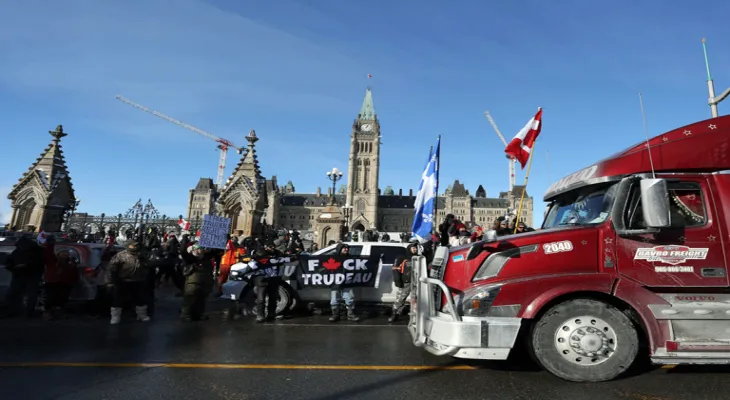Search here
Newspaper
Search here

Arab Canada News
News

Published: October 14, 2022
An Ottawa resident, who is visually impaired, stated that she felt trapped by the protesters who closed the streets during the anti-COVID-19 protest last winter.
Victoria De La Ronde was among the first people to testify before the Public Order Emergency Commission, which reviewed the circumstances that led to the government's decision on February 14 to invoke the Emergencies Act for the first time in its 34-year history.
The legislation requires a public inquiry after the protest. De La Ronde said she relies on sounds, such as turn signals, in her daily life. She also said she uses food delivery services and taxis. In her testimony on Friday morning, she said that changed when the Freedom Convoy entered the city. "I felt trapped and helpless."
Zikezi Lee – an Ottawa resident who helped secure a court order against the protesters to silence their ongoing noise – also appeared on Friday morning and said she felt there was an atmosphere of chaos in the city as protesters were able to block streets for weeks.
Two Ottawa downtown business associations will also have the opportunity to express the effects of the protests. Both Natalie Carrier, executive director of Vanier BIA, and Kevin McHale, executive director of Sparks Street BIA, will answer questions on Friday.
The day will conclude with two Ottawa city councillors – Catherine McKenney and Matthew Luloff – presenting their views on how to handle the situation. McKenney is in the midst of a mayoral campaign, while Luloff is not seeking re-election in the upcoming municipal election. On Thursday, lawyer Paul Champ, representing a coalition of business and community groups in Ottawa, told Ontario Court of Appeal Justice Paul Rouleau, leading the inquiry, that people in the city are still "traumatized."
He said during his opening remarks: "They are stunned, they are upset, and I can say, Commissioner, in these thirty days, we can have people lining up every day to testify, to tell you their stories."
Keith Wilson, a lawyer representing some of the convoy organizers, downplayed the impact on local businesses while speaking to reporters on Wednesday. He said: "The idea that these businesses suffered serious damage is exaggerated." "And to the extent they were hurt, it was not because of the protests, but because the government took the unusual step of telling many of them to shut down when there was no good reason to close them."
Editing: Yusra BamTaref
Comments